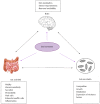Sex hormones in the modulation of irritable bowel syndrome
- PMID: 24627581
- PMCID: PMC3949254
- DOI: 10.3748/wjg.v20.i10.2433
Sex hormones in the modulation of irritable bowel syndrome
Abstract
Compelling evidence indicates sex and gender differences in epidemiology, symptomatology, pathophysiology, and treatment outcome in irritable bowel syndrome (IBS). Based on the female predominance as well as the correlation between IBS symptoms and hormonal status, several models have been proposed to examine the role of sex hormones in gastrointestinal (GI) function including differences in GI symptoms expression in distinct phases of the menstrual cycle, in pre- and post-menopausal women, during pregnancy, hormonal treatment or after oophorectomy. Sex hormones may influence peripheral and central regulatory mechanisms of the brain-gut axis involved in the pathophysiology of IBS contributing to the alterations in visceral sensitivity, motility, intestinal barrier function, and immune activation of intestinal mucosa. Sex differences in stress response of the hypothalamic-pituitary-adrenal axis and autonomic nervous system, neuroimmune interactions triggered by stress, as well as estrogen interactions with serotonin and corticotropin-releasing factor signaling systems are being increasingly recognized. A concept of "microgenderome" related to the potential role of sex hormone modulation of the gut microbiota is also emerging. Significant differences between IBS female and male patients regarding symptomatology and comorbidity with other chronic pain syndromes and psychiatric disorders, together with differences in efficacy of serotonergic medications in IBS patients confirm the necessity for more sex-tailored therapeutic approach in this disorder.
Keywords: Brain-gut axis; Irritable bowel syndrome; Microbiota; Pain modulation; Sex hormones.
Figures

References
-
- Hogan AM, Collins D, Baird AW, Winter DC. Estrogen and its role in gastrointestinal health and disease. Int J Colorectal Dis. 2009;24:1367–1375. - PubMed
-
- Longstreth GF, Thompson WG, Chey WD, Houghton LA, Mearin F, Spiller RC. Functional bowel disorders. Gastroenterology. 2006;130:1480–1491. - PubMed
Publication types
MeSH terms
Substances
Grants and funding
LinkOut - more resources
Full Text Sources
Other Literature Sources
Medical

